Juicing – Frequently Asked Questions

Although juicing is a pretty simple operation, there are several practical problems one is usually faced with when trying to prepare healthy juices at home. Here are some common dilemmas people have to deal with when juicing:
Table of Contents
- 1 Question: Should I Juice Non Organic Foods?
- 2 Question: Should I Peel Oranges Before Juicing?
- 3 Question: Should I Include the White Pithy Part of Oranges?
- 4 Question: Is Juicing Oranges With Seeds Okay?
- 5 Question: Should I Peel Tropical Fruits?
- 6 Should Apples and Pears Be Peeled?
- 7 Question: What About Juicing Apple Seeds?
- 8 Question: Should I be Juicing with Fruits Pits?
- 9 Question: Can I Juice Carrot Greens?
- 10 Question: Can I Juice Bananas?
- 11 Question: How Long Can I Store Juiced Vegetables?
- 12 Related Posts
Question: Should I Juice Non Organic Foods?
Answer: If you can, always select organically grown vegetables and fruits for your healthy juices. Purchasing organic foods is not always easy, nor is it straightforward. It might take you additional time and energy to find a reliable source of organic food, not to mention the additional costs.
If you have to use conventional, non-organic produce, make sure you follow one simple rule: always remove the skin of the non-organic vegetables and fruits you are about to juice. The following foods are usually sprayed with pesticides to a considerable degree:
- celery
- potatoes
- spinach
- peppers
- apples
- cherries
- tart cherries
- pears
- grapes
- peaches
If you can, buy them organic.
Question: Should I Peel Oranges Before Juicing?
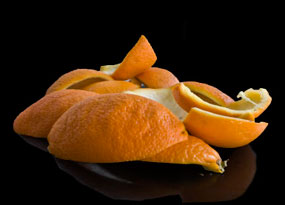 Answer: Yes. Oranges, tangerines and grapefruits should be peeled before juicing. Their skin is not toxic, but it contains oily substances that can cause problems with digestion. The other problem is that if you have non organic oranges, the skin will likely be full of pesticides. So, the best practice is to peel your oranges.
Answer: Yes. Oranges, tangerines and grapefruits should be peeled before juicing. Their skin is not toxic, but it contains oily substances that can cause problems with digestion. The other problem is that if you have non organic oranges, the skin will likely be full of pesticides. So, the best practice is to peel your oranges.
Question: Should I Include the White Pithy Part of Oranges?
Answer: Yes, by all means do so. The pith contains vitamins and important nutrients with antioxidant and anticancer properties. This is also true for lemon and grapefruit pith.
Question: Is Juicing Oranges With Seeds Okay?
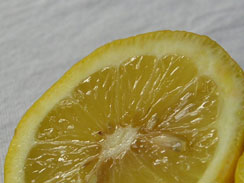 Answer: Lemon, grape and melon seeds are typically considered to be safe. Therefore you can safely leave them when making your favorite juices or juice combinations. Lemon seed are actually healthy, as they have traces of salicyclic acid which is the main component part of Aspirin. Grapefruit seed extract is today very popular due to its antifungal, disinfectant and cleansing properties.
Answer: Lemon, grape and melon seeds are typically considered to be safe. Therefore you can safely leave them when making your favorite juices or juice combinations. Lemon seed are actually healthy, as they have traces of salicyclic acid which is the main component part of Aspirin. Grapefruit seed extract is today very popular due to its antifungal, disinfectant and cleansing properties.
Question: Should I Peel Tropical Fruits?
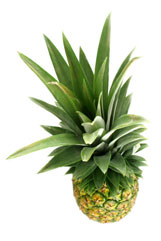 Answer: We always remove their skin. The reason is that tropical fruits are imported from the tropical parts of the world and we have no means of checking how they were produced. As the pesticides are mostly accumulated in the skin, it is always beneficial to remove it prior to juicing. Always peel papayas and mangoes as their skin contains irritants.
Answer: We always remove their skin. The reason is that tropical fruits are imported from the tropical parts of the world and we have no means of checking how they were produced. As the pesticides are mostly accumulated in the skin, it is always beneficial to remove it prior to juicing. Always peel papayas and mangoes as their skin contains irritants.
Should Apples and Pears Be Peeled?
Answer: We almost never peel apples or pears. But then, we try to buy them organic. If you know that your apples or pears have been heavily sprayed with insecticides or pesticides, it is probably a good idea to peel them, as most of the harmful substances are accumulated in the skin. They will still be packed with nutrients. Otherwise, if you use organic apples and pears, don’t. You will remove a lot of beneficial nutrients from the skin.
Question: What About Juicing Apple Seeds?
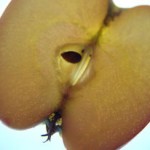 Answer: Always remove apple seeds. The reason is simple – the core of the apple seed contains small amounts of toxic substances. If it is accidentally swallowed without chewing – no harm will be done, since the hard coating protects the inner core of the seed. Even if the seeds are chewed or juiced, the amount of toxins is so small, that it would take a lot of apples to do some damage in adults. However, young children may suffer. Hence, it is better to remove the apple seeds before preparing juices. More info here.
Answer: Always remove apple seeds. The reason is simple – the core of the apple seed contains small amounts of toxic substances. If it is accidentally swallowed without chewing – no harm will be done, since the hard coating protects the inner core of the seed. Even if the seeds are chewed or juiced, the amount of toxins is so small, that it would take a lot of apples to do some damage in adults. However, young children may suffer. Hence, it is better to remove the apple seeds before preparing juices. More info here.
Question: Should I be Juicing with Fruits Pits?
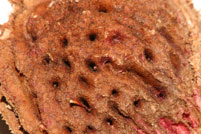 Answer: No. You should leave them out. The pits of all drupes – mango, apricot, plum, peaches, cherries should be taken out prior to juicing.
Answer: No. You should leave them out. The pits of all drupes – mango, apricot, plum, peaches, cherries should be taken out prior to juicing.
Question: Can I Juice Carrot Greens?
Answer: There is a controversy about the health benefits of carrot tops. Some consider them toxic, but they rather have substances that may cause allergic reaction with some people. In addition, they taste not so great, so the conclusion is – do not juice carrot greens unless you know what you are doing. More info here.
Question: Can I Juice Bananas?
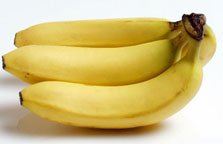 Answer: No, not really. If your juicer recipe contains bananas, the best strategy is to use blender to mix your bananas with the extracted juice from the other fruits or vegetables.
Answer: No, not really. If your juicer recipe contains bananas, the best strategy is to use blender to mix your bananas with the extracted juice from the other fruits or vegetables.
Question: How Long Can I Store Juiced Vegetables?
Answer: The rule of the thumb is up to 24 hours in a refrigerator. But, do not do that too often. Drink your juices withing minutes from extraction. Be aware the the health benefits of many juice combinations may be lost only minutes after the juice was made. If your stored juice has changed color or if it tastes differently, this is an indication of considerable oxidation. Throw it out if you have any doubts in this direction.

Can I freeze banana peels and use them later in the juicer and can I pre make my juices for the week and freeze
Yes you can do both, but I wouldn’t wait so long. When freezing, try to drink the juice within 24 hours.